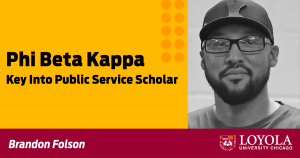
I am learning the Arabic language to strengthen my understanding of who I am.
My name is Brandon Folson, and I am a pre-law student at Loyola University Chicago. I’m majoring in Economics with a double minor in Legal Philosophy and Arabic Language. My goal is to complete a dual JD/MBA degree program.
I belong to the Oglala and Ihanktonwan tribes of the Great Sioux Nation. As a federally recognized Native American Tribal member, I have a Blood Degree Certificate. This federal document shows the degree of Native blood the Federal government has assigned to a tribal member. (for more information, see: https://www.bia.gov/bia/ois/tgs/genealogy). The Lakota people believe that your combined language and lineage is your identity, not your phenotype. Lakota elder Russell Means explained that the Lakota people are dying because “we are losing our language, it’s the essence of our being, it explains who we are” (2011). Russell also explained that languages contain peoples’ worldviews.
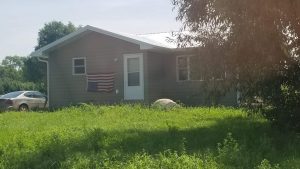
Several Federal housing homes on the reservation fly the American Flag upside down in protest of the government.
When I was a child, I identified myself by my tribe, and I still do because that is my culture. However, non-natives inform me I’m a mixed-race person, and I am Native American, African American, and Syrian American. More people discover they are from a combined racial and ethnic experience through modern-day DNA testing, but how do we use that knowledge to understand ourselves and others?
The Syrian portion of my mixed lineage comes from the maternal side of the family. My mother’s federal blood degree is slightly less than 100%. My maternal great-grandfather is of Syrian origin. The story goes he sought refuge (from what we cannot say) on the Ihanktonwan (Yankton Sioux) reservation in the early 1900s. He married my maternal great-grandmother, Lauren Stricker. Lauren bore him a son and daughter named Joseph and Goldie. Goldie married Spencer from the Oglala, Pine Ridge Reservation, and they bore eight daughters together. My mother is one of their daughters.
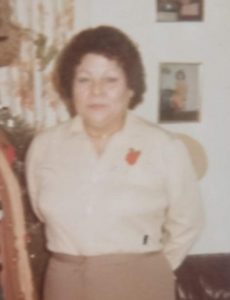
My grandmother of mixed Native American and Arab descent (May She Rest in Peace).
My maternal grandmother’s maiden last name is Abdo, a shortened version of her father’s original family name of Abdus-“unknown.” Unfortunately, we don’t have a record of his original family name. It was customary for natives and non-European immigrants to change their names to European in that era. All the names I have shared are official, but they are not the birth names of my mother, grandmother, great-grandmother, and grandfather. Their original names are Lakota/Dakota names, which I cannot write in English.
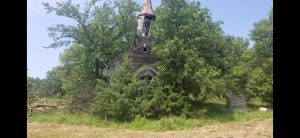
An abandoned church on the Reservation
My mother was one of the native children the U.S. government forced to attend assimilation boarding schools in the early 1960s. The administration gave many Native American children European names at these schools. The Catholic Church operated my mother’s school in Marty, South Dakota, on the Yankton (Ihanktanwan) Sioux Reservation. (https://www.huffpost.com/entry/south-dakota-church-abuse_b_852319)
My grandmother spoke little English but was fluent in all three dialects of Lakota, Dakota, and Nakota. After a few Arabic 101 classes, I quickly realized phonetic similarities between Lakota and the Arabic language. For example, the letter ‘k’ in the Lakota word tȟakóža / tȟakožá (grandchild) is pronounced the same as ‘kha’ in Arabic.
It is difficult for a novice speaker of either language to draw exact comparisons; however, their similarities have aided me in my pronunciation of Arabic letters. Also, the similarities may have helped my maternal great-grandfather of Syrian descent navigate the Lakota/Dakota language when he married my maternal great-grandmother.
I have discovered many cultural similarities between my tribe and Arab culture. For example, Arab culture uses lineage and language to identify you as Arab. Several African countries are considered Arab because of their Arabic language and lineage. An unfortunate similarity is that the Palestinian Arabs that are relegated to the Westbank and Gaza like Native Americans were put on reservations. (https://www.thecrimson.com/article/2001/10/15/native-americans-and-native-palestinians-if/)
Language informs our worldview and gives us our unique identity. The more we understand world languages and cultures, the better we can work together.
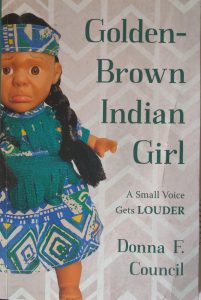
My maternal auntie Donna Council’s book about her experience in the Catholic boarding school on the reservation
The Lakota educational tradition is rooted in interdisciplinary learning. When Europeans first encountered my tribe, they viewed our teepees as primitive living structures. The Europeans didn’t understand that my Lakota ancestors didn’t live in tepees; they lived in a beautiful and spacious world. When they walked out of their tepee, they entered their living room. They designed tepees to get out of unfavorable weather during the day and sleep in at night. Living in the world makes you a student of its wonders.
This philosophy ensured every Lakota child learned phenetics, biology, ecology, zoology, theology, art, government, meteorology, ethics, and morality by embracing the obvious over the pursuit of obscurity. Unfortunately, without learning one another’s language and culture, we scarcely understand one another’s worldviews, and our relationship descended into darkness. We could no more understand why Europeans would build a castle to shield themselves from this beautiful world than Europeans understood our tepees. Perhaps openness to new languages and cultures could have changed that for everyone.
For this reason, Chief Red Cloud of the Lakota Nation allowed a Jesuit school to remain in Lakota territories after the war between our nations ended. That school remains on the Pine Ridge Reservation today and was recently renamed The Red Cloud School (https://www.redcloudschool.org/). Part of the school’s mission is to aid in the restoration of the Lakota language. In 2019, Opus partnered with Loyola University Chicago to give a $1 million award to the Jesuit Red Cloud Indian School on South Dakota’s Pine Ridge Indian Reservation (https://stories.luc.edu/opusprize).
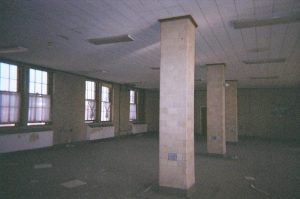
Inside the Catholic Boarding School on the Reservation.
I am learning the Arabic language to strengthen my understanding of who I am. Continuing in the Arabic language program at Loyola University Chicago will allow me to connect with my ancestors and grow as a person.
The support from ustaadha (professor) Sawsan Abbadi and other LUC faculty has been incredible! They have positioned me to become the Phi Beta Kappa Society 2022 Key into Public Service Scholar (https://www.pbk.org/Brandon-Folson) (https://www.luc.edu/cas/). Becoming a Phi Beta Kappa Public Service Scholar is a tremendous honor and a profoundly humbling experience. The PBK scholarship, mentorship, and leadership resources will provide a strong foundation as I continue my meaningful public service career.
